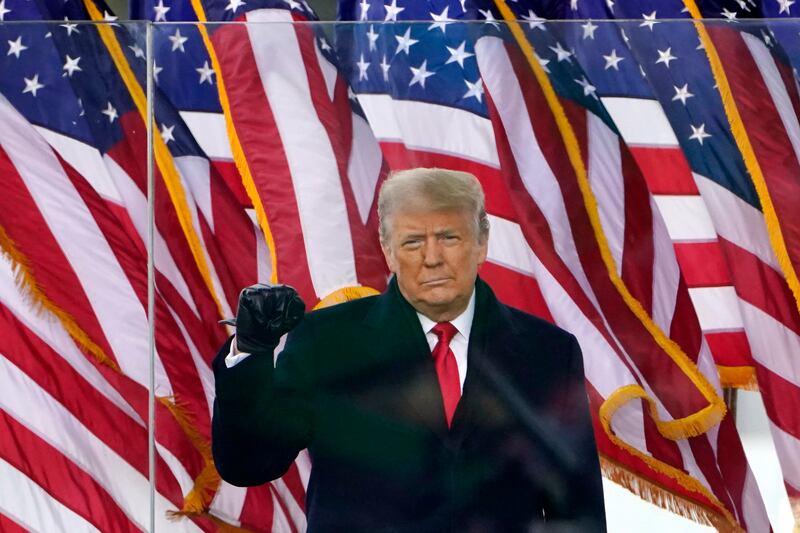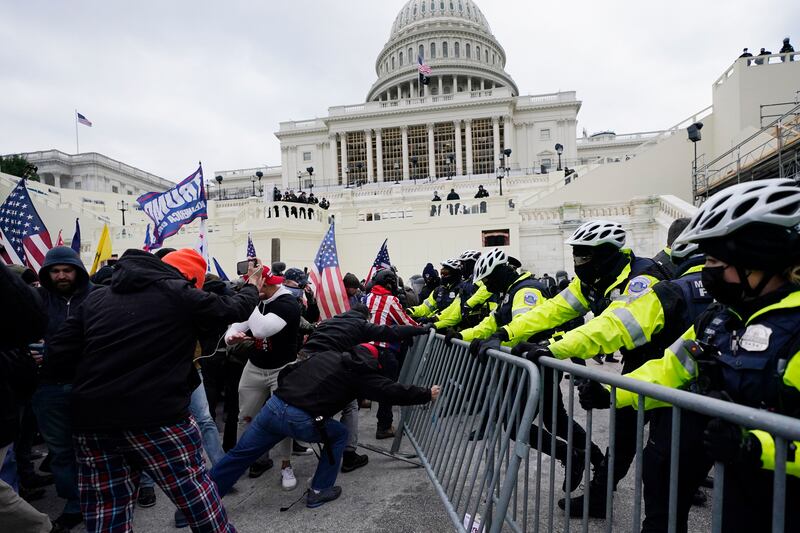While, as previously noted, the U.S. Supreme Court may be inclined to decide Trump v. Anderson on technical grounds and not reach the issue of whether former President Donald Trump engaged in insurrection related to Jan. 6, 2021, the Supreme Court could still reach this substantive issue in the case.
Was Jan. 6 an ‘insurrection’?
To decide whether Trump engaged in insurrection, the first question the Supreme Court will face is whether Jan. 6, 2021, was an insurrection. Those arguing that Jan. 6 was an insurrection point to, for instance, an 1860 definition in Webster’s Dictionary: “(a) rising against civil or political authority; the open and active opposition of a number of persons to the execution of law in a city or state.” The Colorado trial court, where this case began, defined insurrection in the context of Section 3 as “(1) a public use of force or threat of force (2) by a group of people (3) to hinder or prevent execution of the Constitution of the United States.”
Those arguing that Jan. 6 was an insurrection also point to the size of the crowd, the violence that occurred and the goal of stopping the counting of electoral votes.
Those arguing Jan. 6 was not an insurrection put forth different definitions, something like “an organized attempt to overthrow or resist the U.S. Government,” or “an attempted coup, the product of an organized conspiracy to deprive voters of their lawful choice of … president.” And thus Jan. 6 does not qualify, as Stanford law professor Michael McConnell observes, because the events of that day “lasted only about three hours, most of the participants acted on the spur of the moment, few (if any) … carried firearms, and their objectives were narrow: to pressure Congress and the vice president to correct what they … thought were fraudulent election returns.” In other words, Jan. 6 can be viewed, McConnell notes, as “a spontaneous protest by citizens who honestly believed the election had been stolen, and which unexpectedly spiraled out of control.”
It’s possible the Supreme Court could determine that both views of Jan. 6 have merit — that it was an organized conspiracy to change the outcome of the election for some involved, and a spontaneous protest that spiraled out of control for others involved.

Did former President Trump engage in insurrection?
If the Supreme Court determines Jan. 6 was an insurrection, then the next question for the Supreme Court will be whether Trump engaged in insurrection.
Trump argues that he did not — that passionate political and metaphorical speech or a lack of action do not constitute engaging in something. Even if his speech could be viewed as inciting insurrection, that is arguably distinct from engaging in it, and Section 3 only refers to the latter. What is more, he argues that his words and actions generally point in the opposite direction: He urged the crowd prior to its march to the Capitol to “peacefully and patriotically make your voices heard,” his tweets sounded a similar theme, he instructed the secretary of defense to “do what’s required to protect the American people” and he eventually released a video telling the crowd to go home.
Those who argue Trump did engage in insurrection contend that he incited the tumult and that constitutes engaging in insurrection. For support, they note an 1867 opinion by the U.S. attorney general that “where a person has by speech or by writing, incited others to engage in rebellion, he must come under the disqualification.” And they observe that Trump, among other things, repeatedly invited his supporters to D.C. for the Jan. 6 electoral vote count, instructed the crowd regarding Joe Biden becoming president that “(w)e’re just not going to let that happen” and encouraged his supporters to fight and go to the Capitol. Additionally, the argument goes, Trump did not act quickly enough to stop things once they got out of hand at the Capitol.
Was then-President Trump’s speech constitutionally protected?
Finally, if it reaches the insurrection issue, the Supreme Court will have to grapple with the argument that Trump’s speech, which formed the basis for the contention that he engaged in insurrection, is protected by the First Amendment’s free speech clause. The relevant case is called Brandenburg v. Ohio. Decided in 1969, the Supreme Court there found that speech is protected unless it is “directed to inciting or producing imminent lawless action” as well as “likely to incite or produce such action.” Trump argues that his speech surrounding Jan. 6, such as to “fight” and “take back our country,” was no different than other rhetoric used by politicians, and was not intended or likely to incite violence (actual actions by those who hear the speech are not relevant for the 1969 test).
Those who argue the First Amendment provides no protection for Trump’s speech raise two points. First, that his words and actions show that he intended to incite imminent violence, and thus under Brandenburg his speech is not constitutionally protected. And second, that Section 3, which was adopted after the First Amendment, thus excludes a free-speech defense from determining whether someone is disqualified under the 14th Amendment because later constitutional provisions override earlier ones if there is a conflict.
Thursday’s arguments will address these issues and more. Normally the Supreme Court only provides one hour for arguments, but given the numerous issues in the case, the court has scheduled 80 minutes for arguments, which will start at 8 a.m. MST. For those who are unable to listen to the arguments live during a workday, a transcript will be posted here as soon as it’s available (probably later Thursday or early Friday).


